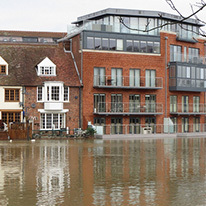This post was originally published on June 16, 2016 and has been updated for accuracy and comprehensiveness.
In 2017, businesses across the country experienced over $31 million in property loss from fire damage.
When businesses face natural disasters, such as fires, 90% of smaller companies fail within a year unless they can resume operations within five days. Larger companies are set for failure too without the proper prevention tools in place. With smoke and fire detectors, you can prevent damage from occurring before it’s too late.
Here’s how to select the best fire and smoke detectors for your business.
Evaluate Your Business’ Specific Needs
Before evaluating equipment options, determine your business’ specific needs and unique liabilities with these questions:
- Where should detectors be installed throughout my building, and how many will I need? It’s a best practice to install detectors on each level of your business. Also consider areas that are at higher fire risk (e.g. kitchens, break rooms with appliances, rooms with fireplaces or lanterns, etc.).
- Will this work with my current business security system? Work with your IT team and security vendor to determine if equipment will communicate with current security equipment prior to purchasing.
- What is my budget? Without compromising security, select a budget with which you are comfortable, and identify equipment that will fit within it.
- Does my security vendor support professional installation and monitoring? Work with your vendor to ensure all equipment is properly installed, working appropriately and communicating with your security and monitoring system.
- What equipment features do I need (e.g. backup battery, voice alarm, hush button)? Having additional features could help improve equipment usability.
- What fire regulations and codes do I need to follow? Get up-to-speed with fire regulations and codes by contacting your local fire department.
If you have questions as to whether a specific feature is good fit for your business, speak with your security vendor.
Research Fire and Smoke Detector Types
Don’t purchase smoke or fire detectors blindly. Prior to buying and installing your detection equipment, take the time to do your research on available options:
- Air-sampling detectors. Detect smoke in areas where sensitive smoke detection is needed.
- Automatic sprinklers. Activate when heat is detected to control the fire.
- Heat sensors. Help detect an increase in thermal energy due to a fire.
- Ionization alarms. Detect invisible fire particles often found in fast-flame fires.
- Dual-sensors. Combine the capabilities of ionization and photoelectric alarms.
- Duct smoke detectors. Close air ventilation units to reduce smoke inhalation.
- Photoelectric alarms. Detect fire particles visible during a slower burning.
- Pull stations. Trigger audible and visual cues when a fire is detected.
If you have questions as to how different equipment works or whether it could be a good fit for your business, work closely with your vendor to educate yourself on options.
For more information, and to see how Vector Security can help achieve your company’s safety initiatives, check out our Monitored Intrusion and Fire Alarms page.


.jpg)
